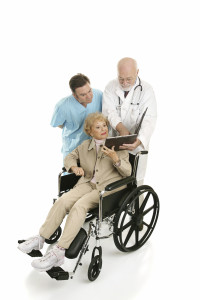 We must greet you with a Halloween Season Hello, Blog Readers! Just because it is Halloween is no reason to be afraid of talking to your doctor, which leads us into our topic.
We must greet you with a Halloween Season Hello, Blog Readers! Just because it is Halloween is no reason to be afraid of talking to your doctor, which leads us into our topic.
A staggering amount of volumes have been written about human communication. However, we seldom hear much about how to talk to our doctors, especially, how to talk to a lung cancer doctor. Communication between patients and their doctors as well as other medical professionals, can be complex and sometimes confusing or emotional.
FLASS: Part I: First Five of Our Ten Best Tips For
Talking To Your Lung Cancer Team
This week, with a little help from lung cancer support experts, Florida Lung, Asthma and Sleep Specialists brings you some communication tips to help you talk about your lung cancer with your health care team.
1. Feel Free To Ask Questions:
At FLASS, we want you to be proactive in your healthcare. We believe that there are no such things as dumb questions. So, you should not ever fear asking questions about your diagnosis, treatment or conditions.
The experts remind us, “Health professionals talk about cancer all day long. So sometimes they forget that you are new to this information.”
Do not fear making a comment like this: I do not quite understand, Doctor. Can you explain that in simple details?
2. Use the Buddy System:
It is permissible for you to bring a friend or family member to the appointments with you. They could even make notes on your questions and the doctor’s answers. Later, you can review the information.
3. Some Medical Professionals Do Not Always Win Popularity Contests:
We are sure that some medical professionals appear detached, unemotional or aloof. Try to remember, this does not mean they are uncaring. Did you know that health care providers are trained to restrain their emotions?
This often misunderstood training is implemented by medical professionals “so they can focus on your treatment and provide you the best care possible.”
4. Do not be afraid to speak up!
As in any type of human intercommunication, it is very important to speak up at any time you misunderstand the treatment plan, or have an issue with your options.
At FLASS, our doctors and staff want to know your concerns and opinions.
5. The Art of Conversational Give and Take.
When you come to our doctors, or any other lung specialist, we believe you should confide what you know about your cancer as well as what you would like to learn, about your case.
This is how it works: By telling your lung cancer doctors what you already know and understand about your condition, they can judge the kind of detail and information you will want to know as your treatment, and your relationship, continues in the future.
A Little Trick from Communication 101 Class:
 (Use this technique if you are uncertain about something your doctor has just said to you.) Summarize and recite back instructions and information your doctor gives you, phrasing it in your own words. A Simple Example: (Okay, Doctor, you mean I should take this medicine four times a day, but I should not take two at once, correct?)
(Use this technique if you are uncertain about something your doctor has just said to you.) Summarize and recite back instructions and information your doctor gives you, phrasing it in your own words. A Simple Example: (Okay, Doctor, you mean I should take this medicine four times a day, but I should not take two at once, correct?)
With these five little tips, we hope you can enhance your ability to talk about your lung cancer with your doctor and other health care professionals on your team.
Next week we plan to bring you five more special communication tips, in Part Two of this series on doctor-patient communication, to use when you speak to members of your lung cancer care team.
By the way, please let the Florida Lung, Asthma and Sleep Specialists give you a gentle reminder for this week: Mark your schedule to make the time to take your flu shot soon! Click learn “why” at this recent blog.
At the Florida Lung, Asthma and Sleep Center, we practice compassion and sensitivity in our patient-centered approach to healing.
AT FLASS: Medicine is our science,
Healing is Our Art, and
Achieving the best outcome for our patients is our Mission!

